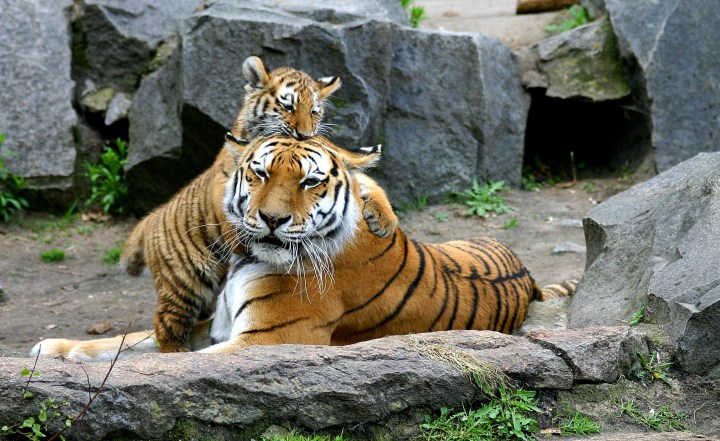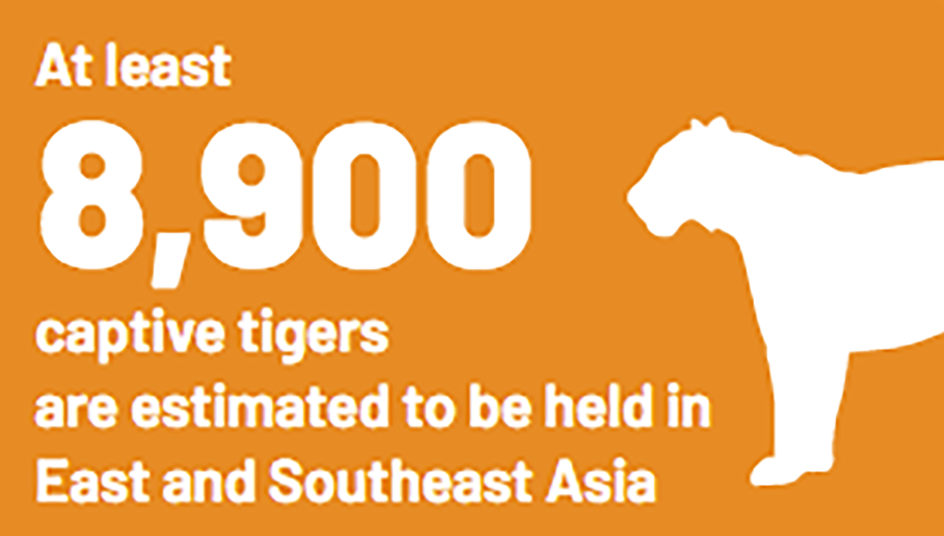WILDLIFE CONSERVATION
South Africa cited in global report that seeks to end captive tiger breeding

Leading environmental organisations, including the WWF, Environmental Investigation Agency, Panthera, Wildlife Justice Commission and Four Paws, have produced a roadmap to end the captive breeding of endangered tigers. The report shows how South Africa, a major breeder, could exit tiger farming.
Nearly 9,000 tigers are being bred in more than 300 facilities in Asia for the commercial sale of their cubs, skins and body parts as well as adult tigers. The numbers for South Africa’s “tiger farms” are unknown as tigers are considered exotic in SA and do not fall under protection legislation, but they are believed to be considerable.
The scale of South African “tiger farms” can be gauged from trade figures. Between 2011 and 2020, South Africa exported 358 live tigers and 93 tiger body parts. Most of these went to Vietnam, China and Thailand. During that time, 54 tiger “trophies” were exported — 27 to China, the rest to Bangladesh, Pakistan and Poland. These statistics, compiled by Four Paws, show that tigers are being bred for both hunting and commercial exploitation.
In answer to a question in Parliament in May 2022, Environment Minister Barbara Creecy said her department estimated there were 70 facilities in SA keeping tigers. However, a year later, she denied that tigers were being exported for commercial purposes.

Phase-out planning for captive tigers.
The previous environment minister, Edna Molewa, flagged the problem in an answer in 2017, saying tigers were alien to South Africa and not regulated by biodiversity or protected species regulations. The department therefore did not keep statistics on tiger or breeder numbers or hunting.
Read more in Daily Maverick: Tigers in South Africa — a farming industry exists, often for their body parts
In a report titled Roadmap to Closing Captive Tiger Facilities of Concern, leading environmental organisations, including the WWF, Environmental Investigation Agency, Panthera, Wildlife Justice Commission and Four Paws, produced a roadmap to end the captive breeding of endangered tigers. The report shows how South Africa, a major breeder, could exit tiger farming.
The report says, “There are significant concerns around captive tiger facilities and their role in the tiger trade in Myanmar, South Africa, and some EU Member States, as well as the large captive tiger population in the United States.”
Read more in Daily Maverick: Captive lion industry breeds crime syndicates, says new investigative report
According to the document, tiger farming is a significant animal welfare problem, with issues including indiscriminate breeding, overcrowding, inappropriate housing systems, genetic abnormalities causing acute suffering, cruel practices perpetuated to better control animals, inhumane slaughtering practices, poor diet and the early removal of cubs from mothers.

Tiger farming also stimulates demand, posing a threat to wild tigers.
“Given the illegal activities and conservation problems attributed to such operations,” says the report, “we recommend that States phase out captive tiger facilities of concern, whilst preventing the creation or growth of further such facilities.” It sets out the steps to do this:
- End the commercial trade in tigers;
- End the illegal trade in tigers and their parts and products;
- Take action to immediately prevent the continued acquisition and breeding of captive tigers;
- Ensure that jurisdiction over captive tiger facilities is vested with central or federal-level authorities;
- Make a central authority licence required to own captive tigers;
- Institute effective management and monitoring systems;
- Make frequent and unannounced inspections by relevant authorities;
- Ensure rigorous enforcement of laws prohibiting the ownership of tigers of illegal origin or without registration;
- Ensure no captive breeding facilities are established primarily for commercial purposes masquerading as scientific or conservation entities;
- Conduct a thorough audit of all captive tiger facilities;
- No compensation to be given to tiger breeders, as a compensation package could potentially be a financial incentive encouraging further breeding;
- Draft phase-out plans; and
- Put in place a clear timeline.
South Africa’s Department of Environment is in the process of phasing out captive lion breeding. These steps provide useful guidelines for this process as well as for winding down tiger breeding. DM




















 Become an Insider
Become an Insider
This fuzzy, wouldn’t it be nice, article falls down over the second step:- “End the illegal trade in tigers and their parts and products”. Efforts over many years and millions of dollars spent show that this can’t be done. Yes, there are shocking examples of animal abuse, but do what you can about this, do not make wild tigers the only source of body parts, and thus condemn them to extinction. Why stop tiger breeding in South Africa where one can at least police animal welfare?
As usual the do gooders and environmentalists are smoking their socks.
Whilst it’s probable if not inevitable that there are many immoral and harmful practices the goals of this initiative will have significant and serious consequences if implemented.
Firstly the legal trade in these products doesn’t increase demand.
Secondly no practice no matter what it is or where it’s if banned results in cessation of the activities.
War on anything banned only results in more effect illegal, underground activities to supply the product.
If you want to, collapse demand for, tiger products increase supply. The demand only exists because it is scarce. That human nature at play. Ego and arrogance.
Better to properly regulate the husbandry and trade to ensure safe conditions for the animals.
Thinking the stopping legal supply will reduce poaching or lead to greater numbers in the wild is pure fantasy.
One day they will harvest your kidneys or your eyes and sell those two, as there is already a market for them. The problem is that everything is monetised and made into a commodity simply because of human greed, nothing more nothing less.
I have been involved with Wildlife Conservation for fifty years. You would expect South Africa to be a leader in Wildlife Conservation. Absolutely the opposite. South Africa is the worst in the world. Wildlife trafficking is a huge business in South Africa. Even the president Ramaphosa is deeply involved.
Boycott South Africa!!!!!